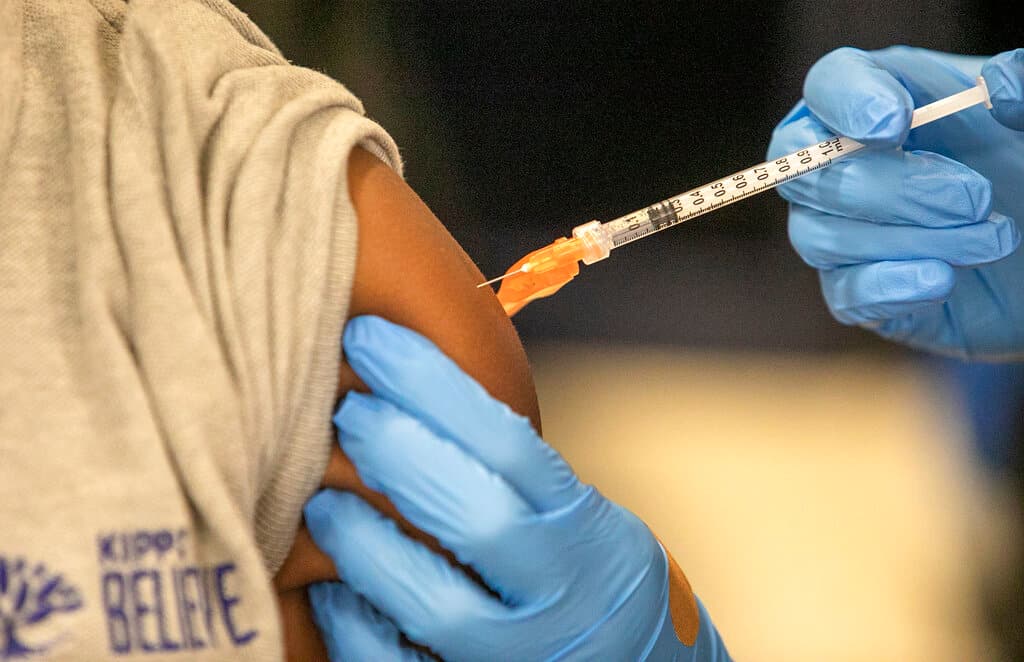‘A Ludicrous Policy’: Despite Drop in Covid Deaths, Vaccine Mandates Persist at Some Colleges
More than three years into the pandemic, some college students and faculty must still be vaccinated to enter campus.

With students set to return to classes next month, nearly 100 private and public colleges in America are maintaining their Covid vaccine mandates even though the pandemic is no longer deemed a national emergency.
While most of the roughly 4,000 colleges in the country have rescinded the requirement, those that have kept it might be acting upon “a tremendous level of fear among college administrators and faculty” toward the possibility of Covid outbreak and severe illness, a co-founder of the advocacy group No College Mandates, Lucia Sinatra, tells the Sun.
The first university in the nation to require Covid vaccination for students, Rutgers University, remains one of the last to keep it. At New Jersey’s public flagship, health policy necessitates that all students and employees be fully vaccinated “with limited exceptions” and upload proof of vaccination to the school’s online portal, according to the university website.
This policy from March 2021 seeks to support “Rutgers’s commitment to health and safety for all members of its community” — yet it exceeds the most recent guidance provided by the state, which merely “encouraged” individuals six months and older to get vaccinated as soon as possible.
Although the school requires the primary vaccine series, it does not require the booster shots, a policy that a New Jersey state senator, Declan O’Scanlon, calls “ludicrous” amid evidence that the benefits from the initial jab waned in the face of new strains.
“Broad-based policies like this should only be enacted with the goal of protecting individuals from someone else’s action or inaction,” Mr. O’Scanlon said in a rebuke of Rutgers’s mandate. “It’s not the job of Rutgers, or Governor Murphy, or anyone else to enact a policy to protect me from myself and my own decisions — or from some perceived protection of my own self due to my own decisions.”
In the event that students are given an exception to the vaccination requirement, they will need to receive regular testing and have no assurance of attending class in person. “If their choice is that they cannot be here under these conditions, we understand that,” the chief operating officer at Rutgers University, Antonio Calcado, told Fox 5 San Diego.
Santa Clara University in California has taken it a step further: The Jesuit university at Silicon Valley does not accept medical or religious vaccine exemptions of any kind from its students, allowing only faculty and staff to submit religious exemptions.
An internist at the University of Rochester, Clayton Baker, questioned these rules in an open letter to the SCU president, Julie Sullivan, and medical chief, Lewis Osofsky. “There is zero legitimate clinical indication for college students to get the COVID-19 vaccine, especially at this late date,” he wrote.
The Covid hospitalization rate has ticked up since early July, with more than 10,000 people becoming hospitalized with Covid in the first week of August, according to data from the US Centers for Disease Control and Prevention. Yet the rates of infection and death remain much lower compared to the past and primarily affect senior citizens over other age groups.
Colleges are not the only ones clinging to Covid restrictions: A Hollywood studio, Lionsgate, announced that its employees must once again wear medical-grade face masks at its flagship office, citing rising case counts at Los Angeles.
In April, President Biden ended the national emergency declaration responding to the pandemic three years after President Trump had pronounced it. Nearly a year ago, Mr. Biden declared in a “60 Minutes” interview that “the pandemic is over.”
Rutgers’s decision to maintain the mandate might have a “small ripple effect” in inspiring other colleges, especially those in New Jersey, to keep them or bring them back, Ms. Sinatra speculates. The school has helped set the standard for vaccination on college campuses, as it runs clinical trials for the three major manufacturers of the Covid vaccine and is partnered with Pfizer to run its pharmaceutical industry fellowship program.
Ms. Sinatra postulates that Rutgers’s vaccine requirement might also be an effort by the university to continue supporting one of its largest pharmaceutical funders: “If Rutgers all of a sudden lets go of that mandate, what does it mean for Pfizer and this symbiotic relationship that they have?”
Higher education institutions, especially public ones, have a fiduciary responsibility to demonstrate why Covid vaccine mandates are necessary to protect the community, Ms. Sinatra says. “They should have been doing their due diligence with the CDC to see if these vaccines actually protected the community by preventing infection and transmission,” she says. “How could they have justified a mandate? How can they justify one today?”
Meanwhile, the organization of college health professionals, the American College Health Association, has insisted that “though tempting, college health cannot yet completely turn the page on the pandemic,” according to guidelines posted in June. “Long COVID, ongoing surveillance, data tracking, misinformation/disinformation, and vaccination will continue to challenge our resources for the foreseeable future.”
The Press Office of Rutgers University did not respond to the Sun’s request for comment by deadline.

